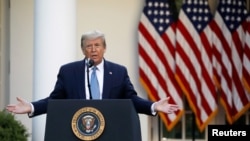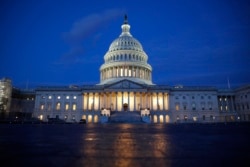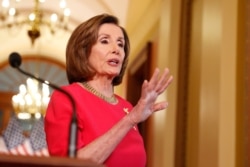President Donald Trump warned this week that he might use a never-before-invoked power under the U.S. Constitution to adjourn the Congress unless it took steps to confirm a number of his appointments.
But lawmakers and legal scholars say the move is unlikely and not actually permissible in the way the president is trying to use it.
“It's a huge unprecedented power grab for the executive branch to tell Congress when they are adjourned or to adjourn them for themselves. It's just never been done, even in times of war and depression,” said Casey Burgat, an expert in congressional procedure at the George Washington University Graduate School of Political Management.
What did Trump say?
During a Wednesday news conference, Trump appeared to be claiming an authority under Article II, Section 3 of the Constitution to end the 116th session of Congress because, he said, congressional Democrats were obstructing his nominees for judicial posts and government agencies.
“The Senate should either fulfill its duty and vote on my nominees, or it should formally adjourn so that I can make recess appointments,” Trump said. “We have a tremendous number of people that have to come into government, and now more so than ever before because of the virus, and the problem.”
Currently, there are 82 administration nominees waiting for confirmation in the Republican-majority Senate. Burgat noted that a small fraction of these nominations had moved through committees and awaited floor action.
“This is a case where the Senate Republicans don't want to move on the nominees that he has put forward, otherwise they would have. Or, there's just not a lot of nominees to consider,” Burgat said.
What does Article II say?
Article II, Section 3 of the Constitution grants the president the power to “on extraordinary Occasions, convene both Houses, or either of them, and in Case of Disagreement between them, with Respect to the Time of Adjournment, he may adjourn them to such Time as he shall think proper.”
This means that the president would be able to adjourn Congress only if congressional leaders disagreed on adjournment. Congressional leaders have already agreed on a time for adjournment: January 3, 2021.
What is the pro forma session Trump is criticizing?
Currently, Congress is not holding any confirmation hearings because lawmakers are back in their home districts and states to observe safety guidelines relating to the coronavirus pandemic. Under normal circumstances, lawmakers often depart Washington, D.C., to return to their home districts to observe holidays and meet with constituents.
Instead of completely terminating the session of Congress, the House and Senate hold a pro forma meeting — a brief meeting often with only one lawmaker who technically keeps the chamber in session, even though lawmakers are out of town and not conducting hearings or holding votes in the Capitol.
These pro forma meetings are regularly held while Congress is out of town. In this case, the break is longer than expected because of health concerns about spreading the coronavirus if large groups of lawmakers gather in the Capitol.
Why would an adjournment of Congress help Trump’s appointments?
The Constitution gives power to both the president and the Senate to make appointments of high-level federal officials. It also gives the president the power to temporarily appoint these officials without Senate approval — so-called recess appointments — when the Senate is out of session for more than 10 days.
Trump is proposing a way to stop the pro forma meetings and adjourn Congress so that he can make these recess appointments.
“The current practice of leaving town while conducting phony pro forma sessions is a dereliction of duty the American people can’t afford during this crisis,” Trump said Wednesday.
What would congressional leadership need to do to adjourn Congress?
As the Constitution says, the president can adjourn Congress only if congressional leadership disagrees on an adjournment.
“For Trump to declare it, the Senate would have to bring back all their members to vote on adjournment and it would have to pass,” Burgat said.
The adjournment would then have to be considered by the leader of the Democratic-majority U.S. House of Representatives — Speaker Nancy Pelosi.
This is a highly unlikely proposal from a logistical standpoint, given that the full membership of both chambers cannot return to Washington because of the COVID-19 pandemic.
Senate Majority Leader Mitch McConnell did not directly address this issue in a statement Wednesday, saying only that he had spoken with Trump earlier about the issue and had “pledged to find ways to confirm nominees considered mission-critical to the COVID-19 pandemic, but under Senate rules, that will take consent from Leader Schumer.”
Is this legal?
Any attempt by the chief executive to adjourn a session of Congress would almost certainly be met with challenges in the U.S. court system, meaning Trump’s claim will ultimately never come to pass.
Representative Justin Amash, an independent who left the Republican Party over disagreements with Trump, noted in a Tweet on Wednesday, “Without one chamber participating in this improper scheme, this action would be unconstitutional. The president has no general, unilateral power to adjourn Congress.”
Burgat noted that in 2014, the U.S. Supreme Court said then-President Barack Obama had overstepped his constitutional authority by making appointments while the Senate was in pro forma sessions.








